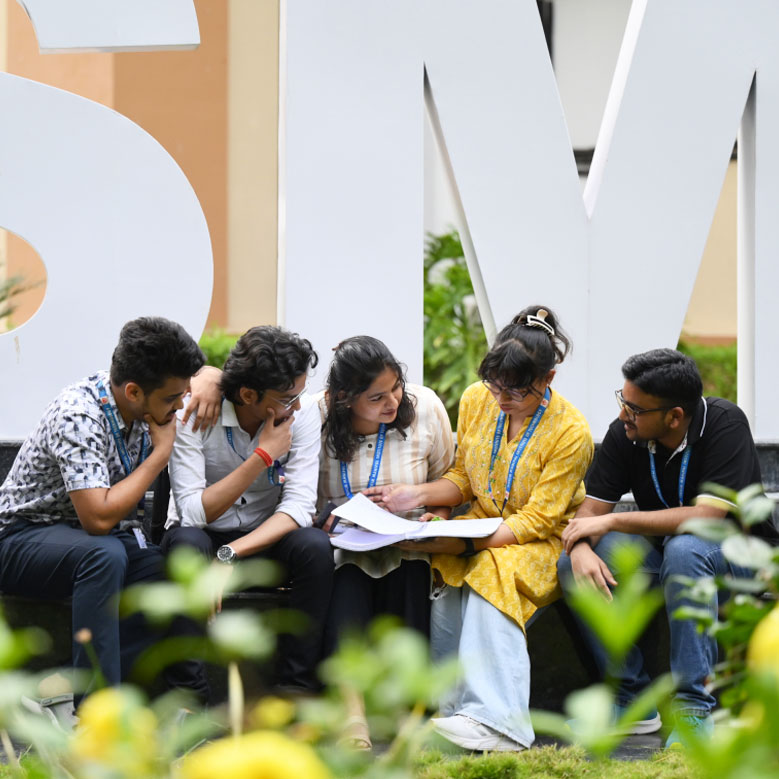DATES TO REMEMBER :
25th Jun 2025 : Last Date to Apply for Indian Admissions
01st Aug 2025 : Course commencement date
Overview
The Master of Computer Application program at Sikkim Manipal Institute of Technology is aimed at
providing students with academic skills, logic and reasoning ability for their overall development
to help them get jobs in the public and private sectors and the software industry.
The course is approved by AICTE and is accreditated by NS-EN ISO 9001:2000.
It is a 2 years course with an intake capacity of 30 seats. The course is offered by SMIT in the
Majitar campus.

Crafting success
stories with excellence
in education.
ELIGIBILITY
- Passed BCA / B.Sc(Computer Science) / BSc. IT/ BE (CSE) / B.Tech(CSE) / BE(IT)/ B.Tech IT/ Equivalent degree OR Passed any graduation degree (BE/B.Tech/B.Sc/ B.Com/BA/B.Voc/etc.) preferably with Mathematics at 10+2 or Graduation level OR Obtained at least 50% marks (45% for Reserved Category) in the qualifying exam.
Program FEES
| Fee | Fees For General (Gen), North East (NE), Defence (Def), ParaMilitary Force (PMF) ,GTA & SAARC | Fees For Sikkim Quota Students | Fees For Non SAARC |
| Caution Deposit | 5,000 | 5,000 | 5,000 |
| Exam Fees (One time per year) | 3,500 | 3,500 | 5,000 |
| Lumpsum | 1,69,600 | 97,500 | 2,12,000 |
| YEARLY | Fees For General Category Students | Fees For Sikkim Quota Students | Fees For Non SAARC |
| First Installment | 88,300 | 50,850 | 1,10,200 |
| Second Installment | 88,300 | 50,850 | 1,10,200 |
- MCA graduates will have successful career based on their understanding of formal and practical methods of applications development using the concepts of Computer Programming, Software and Design Principles.
- MCA graduates will be prepared for pursuing higher studies in their related field.
- MCA graduates will demonstrate analytical and design skills including the ability to generate creative solutions and foster team-oriented professionalism.
- MCA graduates will exhibit effective work ethics and be able to adapt to the challenges of dynamic professional environment.
- Computational Knowledge: Apply the knowledge of mathematics, fundamentals of computing, and fundamentals of machine learning to solve software development problems.
- Problem analysis: Identify, formulate, review and analyse computing processes and arrive at substantial conclusions using principles of mathematics, and computing sciences.
- Design/development of solutions: Design and evaluate solutions for complex computing problems, along with their components, and processes that meet the requirements with appropriate consideration of public health and safety measures.
- Conduct investigations of complex problems: Use research-based knowledge and research methods including design of experiments, analysis, and interpretation of data, and synthesis of the information to provide valid conclusions.
- Modern tool usage: Create, select, and apply appropriate techniques, resources, and modern engineering and IT tools including prediction and modelling for the computational problem with an understanding of its limitations.
- Environment and sustainability: Understand the impact of developing a solution for a computational problem in societal and environmental contexts and demonstrate the knowledge context of the sustainable development environment.
- Ethics: Apply ethical principles and commit to professional ethics and responsibilities and norms of professional computing practice.
- Individual and teamwork: Function effectively as an individual, and as a member or leader in diverse teams, and multidisciplinary settings.
- Communication: Communicate effectively on complex engineering activities with the engineering community and with society at large, such as being able to comprehend and write effective reports and design documentation, make effective presentations, and give and receive clear instructions.
- Project management and finance: Demonstrate knowledge and understanding of the computing and management principles and apply these to one’s work, as a member and leader in a team, to manage projects and in multidisciplinary environments.
- Life-long learning: Recognize the need for and have the preparation and ability to engage in independent and life-long learning in the broadest context of technological change.
- Innovation and Entrepreneurship: Identify a timely opportunity and using innovation to pursue that opportunity to create value and wealth for the betterment of the individual and society at large.
- PO1 (Foundation Knowledge): Apply knowledge of mathematics, programming logic and coding fundamentals for solution architecture and problem solving.
- PO2 (Problem Analysis): Identify, review, formulate and analyse problems for primarily focussing on customer requirements using critical thinking frameworks.
- PO3 (Development of Solutions): Design, develop and investigate problems with as an innovative approach for solutions incorporating ESG/SDG goals.
- PO4 (Modern Tool Usage): Select, adapt and apply modern computational tools such as development of algorithms with an understanding of the limitations including human biases.
- PO5 (Individual and Teamwork): Function and communicate effectively as an individual or a team leader in diverse and multidisciplinary groups. Use methodologies such as agile.
- PO6 (Project Management and Finance): Use the principles of project management such as scheduling, work breakdown structure and be conversant with the principles of Finance for profitable project management.
- PO7 (Ethics): Commit to professional ethics in managing software projects with financial aspects. Learn to use new technologies for cyber security and insulate customers from malware
- PO8 (Life-long learning): Change management skills and the ability to learn, keep up with contemporary technologies and ways of working.
- Click Here for Course Outcome.
- Click Here for Program Outcome.
- Click Here for MCA syllabus.
- Application Programmer
- Software Developer
- System Analyst
- Database Administrator
- Information Security Executive
- Malware Analyst
- Data Centre Technician
- Chief Information Security Officer
- Manager–Anti-Virus Development
- Data Centre Manager
Entrepreneurship
Development cell (EDC)
Helps students in exploring entrepreneurial opportunities.

Students are encouraged to engage in practical's making them industry ready

World-class campus in a tranquil environment

Best-in-class laboratories and workshops for practical exposure


